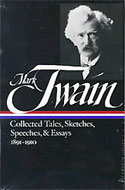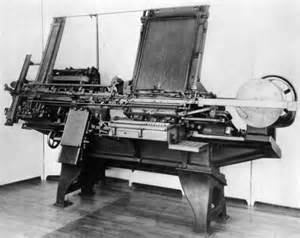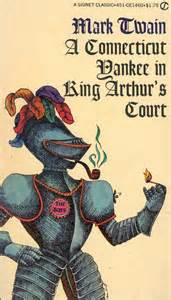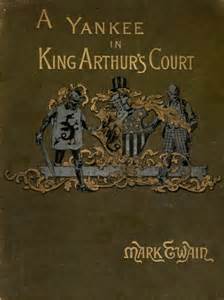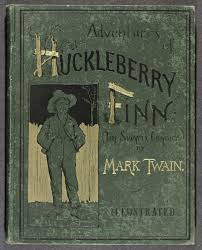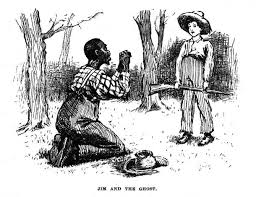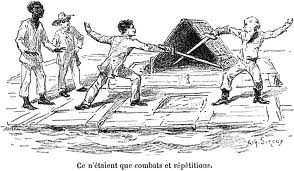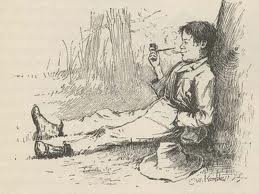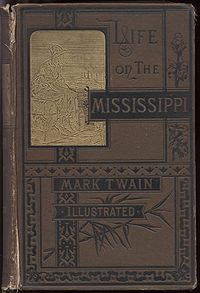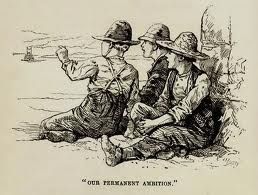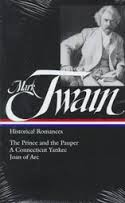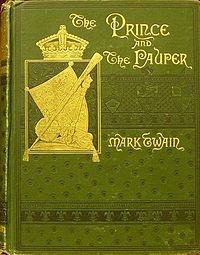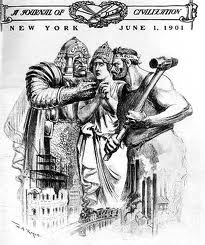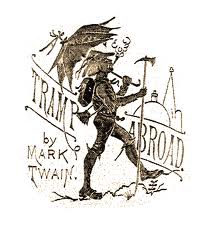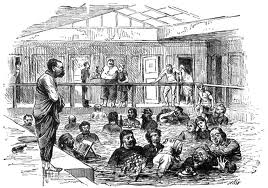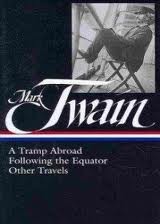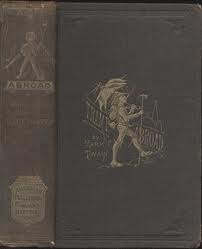“Ah, Lasca, you are a fortunante girl!—this beautiful house, this dainty jewel, that rich treasure, all this elegant snow, and sumptuous icebergs and limitless sterility, and public bears and walruses, and noble freedom and largeness, and everybody’s admiring eyes upon you, and everybody’s homage and respect at your command without the asking; young, rich, beautiful, sought, courted, envied, not a requirement unsatisfied, not a desire ungratified, nothing to wish for that you cannot have—it is immeasurable good fortune! I have seen myriads of girls, but none of whom these extraordinary things could be truthfully said but you alone. And you are worthy—worthy of it all, Lasca—I believe in my heart.” (“The Esquimau Maiden’s Romance, 126)
The 1890s were traumatic for Mark Twain. His company Webster & Co. went into debt over Paige typesetters. The company was kept afloat with Twain’s investments, but he could not raise capital and the prototypes were unsuccessful as well. In 1894 he assumed the company’s debts and declared bankruptcy. In current dollar amounts, the investments cost him millions. He spent some of the early 1890s in Europe, where he underwent treatments for various physical ailments. In regards to his writing, he produced a dozen or so important sketches (see below), The American Claimant, Tom Sawyer Abroad, Pudd’nhead Wilson, Tom Sawyer, Detective, and Personal Recollections of Joan of Arc. This is his last productive years, despite his financial and physical problems. The last fifteen years of his life, after the 1896 death of his daughter, would be focused on shorter writings and one final travelogue (Around the Equator).
The seventeen entries from the Library of America anthology of Mark Twain’s shorter works covering these five years are all interesting and most of them speak to some of the themes of this blog. He returns from time to time to his role as a humorist, but his writing is clearly becoming more serious and pointed in regards to its social critique.
The short writings from 1891 were produced while in Europe. Two deal directly with life in Europe (“Aix-les-Bains” and “Playing Courier”), especially his therapeutic treatments as Swiss spas. “Mental Telegraphy” is a humorous take on the phenomenon of people around the world arriving at a similar idea. This seems to have been happening a lot in the period of technological revolutions. The most well-known of these happened earlier with the Newton-Leibnitz situation. Both invented calculus independently. Twain mentions the more contemporary Darwin-Wallace coincidence. Fascinating for me is what this tells us about the reality of tides of history. There do seem to be moments when people around the world come to a certain realization. I think we are getting there with anti-capitalism (Occupy was one sign of this).
We have only one short writing from 1892, “The Cradle of Liberty.” This is an important work because it (like The Adventures of Tom Sawyer) challenges American pretentions about being the home of liberty. He argues that Switzerland has a much deeper and more authentic experience of liberty, worked into its society and politics. “After trying the political atmosphere of the neighboring monarchies, it is healing and refreshment to breathe an air that has known no taint of slavery for 600 years, and to come among a people whose political history is great and fine, superlatively great and fine, and worthy to be taught in all schools and studied by all races and peoples.” (49–50)
Eighteen-ninety-three was more productive in short writings. This anthology collected seven works, including some short stories, from that year. “The £1,000,000 Bank-Note” is an interesting commentary on wealth. The experiment of giving someone such a bill and seeing if that makes her rich is an important thought exercise in a time when people hoard enormous and grotesque amounts of money. Of course, in real life, these figures make no sense. Only in the world of high finance and in theory do currency amounts like £1,000,000 have any real meaning. “About All Kinds of Ships” does a few things. By putting Noah’s Ark into the modern bureaucratic regulatory system, he asks interesting questions about freedom and progress. His larger point is that progress (technological or otherwise) is largely meaningless is it is just abstract improvements or removed from our daily lives. A new steamer (or new green city in China) may be progress but prove to be distractions if not actually improving the lives of most people. “We are victims of one common superstition—the superstition that we realize the changes that are taking place in the world because we read about them and know what they are.” (81) “Extracts from Adam’s Diary” is an important work from this year. It should be read for pure pleasure and joy. I suppose we could weigh it down with theological arguments or questions about Twain’s religious point of view. At its heart, is the story of two strangers, through suffering and exile, coming to know and love each other. Such tales of solidarity and shared sacrifice always seem beautiful to me. The last lines almost bring me to tears. “It is better to love outside the Garden with her than inside it without her. At first I thought she talked too much; but now I should be sorry to have that voice fall silent and pass out of life. Blessed be the chestnut that brought us near together and taught me to know the goodness of her heart and the sweetness of her spirit!” (108) I also enjoyed “The Esquimau Maiden’s Romance,” which I read as another commentary on wealth and social prestige. On one level we see the Esquimau embracing the concept of wealth and hierarchy through the collection of fish hooks. There are the same type of conspicuous consumption that Twain knew of too well in America. However, the value of the fishhooks—the source of wealth—is clearly superfluous to society. Much like the hoarders of wealth in late capitalist societies, their wealth is a fiction (even if their power is not). Thus, much of the story is an attempt to describe wealth in real terms, which inevitably enter into the interpersonal realm. “Travelling with a Reformer” is a humorous attack on the regulations and laws promoted by Progressive-era reformers, in this case a welfare capitalist targeting card playing.
There is not much to say about 1894, which consisted of a musing on the “Jumping Frog” story and a personal reminiscence of a Scotchman named Macfarlane, with frontier-style brutishness but also a strong moral logic that Twain thought was lacking in his day. “He said that man’s heart was the only bad heart in the animal kingdom; that man was the only animal capable of feeling malice, envy, vindictiveness, vengefulness, hatred, selfishness, the only animal that loved drunkenness, almost the only animal that could endure personal uncleanliness and a filthy habitation, the sole animal in whom was fully developed the base instinct called patriotism, the sole animal that robs, persecutes, oppresses, and kills members of his own immediate tribe, the sole animal that steals and enslaves the members of any tribe.” (163)
As for 1895, we have Twains’ dual polemics against James Feminore Cooper’s writing. Of course, Cooper’s “literary crimes” are real, but part of me wonders if Twain is not in part hacking the culture of efficiency that shaped industrializing America. Twain seems to be making a case that Cooper should have written according to scientific precision. I am supportive of wasteful writing, of course, hence this blog’s existence.
Coming up: Twain’s later novels.
